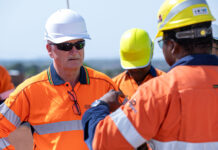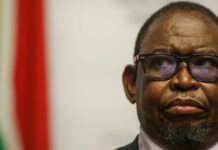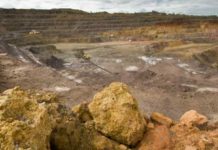
[miningmx.com] — SOUTH AFRICA has improved its position in the latest
ranking of jurisdictions as lucrative mining destinations in the authoritative annual
survey prepared by Canada’s Fraser Institute, even though fears over policy changes
and labour militancy have been highlighted as major concerns.
The country ranked 54 out of 93 countries and provinces for its overall policy
attractiveness, a significant improvement from being 67th out of 79 jurisdictions in
2011.
The rating is in terms of the survey’s Policy Potential Index, which assessed mining
company executives’ views on the attractiveness of the mining policies being
implemented by the governments of various destinations. The results for the 2011/12
report were released on Thursday.
The rating will come as a boost to Mines Minister Susan Shabangu, who in 2010
acknowledged the “profound influence’ that the Fraser survey has on investment
decisions globally. She proclaimed at various international roadshows in 2011 that
“South Africa was open for business’, despite calls from the ANC Youth League for
the nationalisation of the country’s mines and her failure to complete the review of
the Mineral and Petroleum Resources Development Act (MPRDA) last year.
Botswana is still viewed as Africa’s most favourable destination in terms of policy,
ranking 17th overall, followed by Morocco (34th), Burkina Faso (38th) and Mali
(42th). At the opposite end of the table, Guinea ranks worst at 83rd, followed by
Egypt (77th), the Democratic Republic of Congo (76th) and Zimbabwe (74th).
Honduras remains the world’s least favourable destination.
Still, what should be of concern to the South African government and workers’
unions alike is the county’s 90th position in the index for labour regulations,
employment agreements and labour militancy or work disruptions – as illustrated by
the current standoff at Impala Platinum’s Rustenburg mines.
Among the respondents, 34% have indicated South Africa’s troubled labour relations
as a strong deterrent not to invest, with 3% saying they would not pursue
investment at all due to this factor. Another 46% have stated labour relations as a
“mild’ deterrent.
Similarly, South Africa ranks 79th when it comes to growing (or lessening)
uncertainty in mining policy and implementation, and a 80th place for physical
security. Among the respondents, 9% said they would not invest in the country at all
due to growing uncertainty, with 31% describing it as a strong deterrent.
As for security, 42% have said it was a strong deterrent, with another 2% saying
they would not invest here at all.
South Africa’s ranking in some of the other indexes are as follow:
– Uncertainty concerning the administration, interpretation and enforcement of
existing regulations: 70
– Uncertainty concerning environmental regulations: 42
– Regulatory duplication and inconsistencies: 58
– Legal processes that are fair, transparent, non-corrupt and efficient:
57
– Taxation regime: 57
– Uncertainty concerning which areas will be protected as wilderness parks or
archaeological sites: 30
– Infrastructure: 45
– Socio-economic agreements/community development conditions:
79
– Political stability: 77
– Geological database: 39
– Corruption: 69










